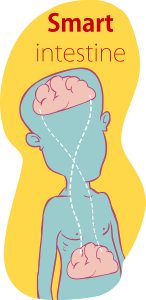 Among all the indignant maladies that visit seniors, digestive problems (cramps, flatulence, bloating, etc.) can be the most annoying. After a recent bout of the catch-all diagnosis “irritable bowel syndrome,” I became curious about probiotics and natural supplements for a healthy gut. I was surprised to learn than probiotic supplements were highly recommended for senior brain health as well. I now take daily probiotics for brain health.
Among all the indignant maladies that visit seniors, digestive problems (cramps, flatulence, bloating, etc.) can be the most annoying. After a recent bout of the catch-all diagnosis “irritable bowel syndrome,” I became curious about probiotics and natural supplements for a healthy gut. I was surprised to learn than probiotic supplements were highly recommended for senior brain health as well. I now take daily probiotics for brain health.
What Exactly Are Probiotics?
According to WebMD.com, probiotics are live bacteria and yeasts that are good for your digestive system. We usually think of germs that cause diseases. But your body is full of bacteria, both good and bad. Probiotics are often called “good” or “helpful” bacteria because they help keep your gut healthy.
What Do Good Gut Bugs Do?
That’s not all our bugs do, however. Our internal bacteria aren’t just in our intestines. They’re everywhere, living in symbiosis, functioning along with our organs. Gut bugs assist the immune system, provide enzymes for digestion and to make vitamins and communicate with the brain. Over 70% of our neurotransmitters, for example, serotonin and dopamine, are made in the intestines with the help of our bugs and sent to the brain.
The gut bacteria house over 70% our immune system. They outnumber our own cells by 10:1. While the human genome is made up of over 22,000 genes, when you add in the genes of our microbiome the figure comes out between two and 20 million microbial genes. The human microbiome contributes some 8 million unique protein-coding genes.
Healthy Bacteria for Brain Health
That’s why bacteria are so important to senior health. Seniors naturally lose bacteria as they age, some of which are destroyed by prescription of broad-spectrum antibiotics. While antibiotics are necessary to kill bad bugs, they also kill good bugs. We need to repopulate the microflora after taking medications. Where do you find probiotics for brain health?
You can find probiotics in supplements and foods, like yogurt and fermented foods like sauerkraut. If you look at the labels of the probiotic supplements sold in any pharmacy or health food store they list the names of the live bacteria inside the capsules. Most of them are strains of two bacteria species, lactobacillus and bifidobacterium. Different strains can help with diarrhea and may help people who can’t digest lactose, the sugar in milk.
Adding Bifidobacterium as a probiotic to conventional treatment of ulcerative colitis has been shown to be associated with improved rates of remission and improved maintenance of remission.
With age, we need to pay extra attention to digestive problems which can lead to metabolism problems, malnutrition, lack of vitamins, minerals, and consequently loss of energy. Science has only recently taken an interest in the microbial population.
The Frontier of Research: Bacterial Genes
The Human Microbiome Project was founded by the National Institutes of Health in 2007 to better understand the identities, functions, and genetic contributions of the bacteria that form part of the human body. Microbes contribute more genes responsible for human survival than humans’ own genes. It is estimated that bacterial protein-coding genes are 360 times more abundant than human genes.
And yet, we have always viewed bugs as bad germs. Ever since Fleming discovered penicillin in 1928 we’ve eradicated disease through wide-spread use of antibiotics. We’ve paid little attention to good bacteria and how they help with our immune system, protecting us from harm.
The Brain-Gut Connection
What’s even more surprising is how the gut bugs communicate with the brain. They can trigger depression, anxiety, obsessiveness, and food cravings. They may play a major role in autoimmune diseases, obesity, autism and schizophrenia. Currently, research projects are investigating some of the diseases of the 21st century that have baffled science for so long.
Disruption of a healthy gut biome may be a major source of mood disorders. If that’s so, then restoration with certain probiotics could become a therapeutic approach to psychiatric illnesses. With fermented foods like kimchi, pickles, sauerkraut and other traditional vegetables, probiotic supplementation gives new meaning to Hippocrates’ advice:
“Let food be thy medicine, and medicine be thy food.”

Recent Comments